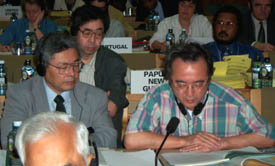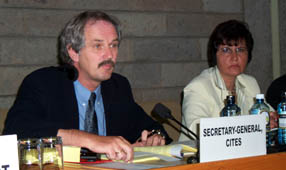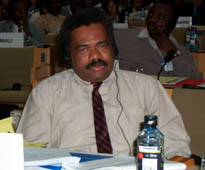| ANTIGUA
and BARBUDA supported the downlisting proposals, citing concerns over
food security |
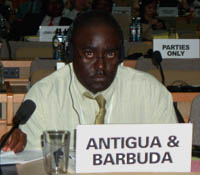 |
|
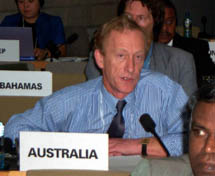
|
Explaining
his opposition to the Japanese proposals, AUSTRALIA acknowledged
IWC efforts to establish an appropriate management regime, but stressed
that no such scheme exists yet. He underscored non-consumptive uses
of whales such as tourism, and questioned the numbers put forward
by Japan.
|
|
 ICELAND supported Japan's proposals and said scientific criteria
should be the determinant. He stated that sustainable development
does not exclude the rational harvest of non-endangered stocks
ICELAND supported Japan's proposals and said scientific criteria
should be the determinant. He stated that sustainable development
does not exclude the rational harvest of non-endangered stocks
|
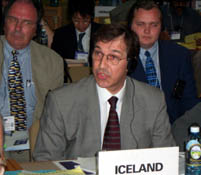 |
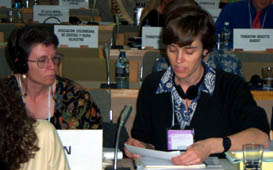 |
IUCN
underscored the factual integrity of its analysis of global whale
stocks, which was questioned by Japan. |
| Delegate
of Suriname seeking clarification from the Japanese delegation. |
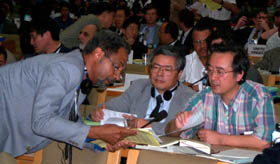 |
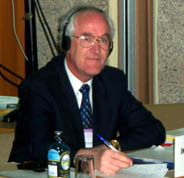 |
Michael
Canny, Chairman of the International Whaling Commission (IWC), underscored
that a management scheme must be developed before commercial whaling
can resume. |
| Delegation
of Japan eagerly waiting the results of the vote on its first proposal
(Prop. 11.15) Delegates rejected the all three Japanese proposals
by a secret ballot vote. Vote results available below. |
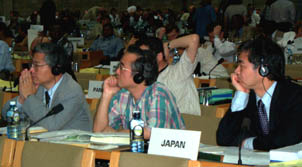 |
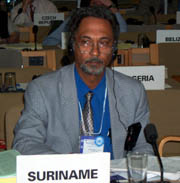
SURINAME proposed an amendment to Japan's proposal to transfer the
stock to Appendix II maintaining a zero quota until COP-12, assuming
that the IWC will have taken a decision on its revised management
system by then and will have set a quota that could be applicable
to CITES. Several delegations noted points of order with Suriname's
amendment, as the Japanese proposal had been defeated. Some felt consideration
of the amendment violated the rules of procedure, and sought clarity
on what would happen if the IWC has not made a decision by COP-12.
SURINAME requested a secret ballot vote and the proposal was rejected. |
 NORWAY introduced its proposal to downlist the Northeast Atlantic
and the North Atlantic Central stocks of the Minke Whale (Prop. 11.18).
He highlighted domestic monitoring mechanisms, including DNA testing.
He underscored that an ecosystem approach should include human needs.
NORWAY introduced its proposal to downlist the Northeast Atlantic
and the North Atlantic Central stocks of the Minke Whale (Prop. 11.18).
He highlighted domestic monitoring mechanisms, including DNA testing.
He underscored that an ecosystem approach should include human needs.
|
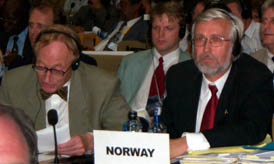 |
BALLOT
RESULTS:
| |
Proposal
(see above for descriptions) |
| |
11.15
|
11.16
|
Suriname |
11.17
|
11.18
|
|
| For:
|
40 |
46 |
47 |
49 |
52 |
|
| Against:
|
63 |
69 |
66 |
67 |
57 |
|
| Abstentions:
|
6 |
4 |
5 |
3 |
9 |
|
| Spoiled:
|
* |
4 |
4 |
2 |
2 |
|
| Total
votes: |
109 |
123 |
122 |
121 |
120 |
|
| Proposal:
|
rejected |
rejected |
rejected |
rejected |
rejected |
|
Under the Rule
of Procedure, a two-thirds majority is required to carry a proposal.
* Spoiled ballots were neither reported nor counted in the first vote. |
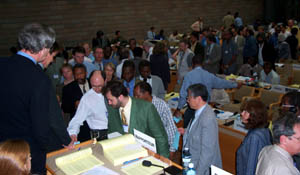 |
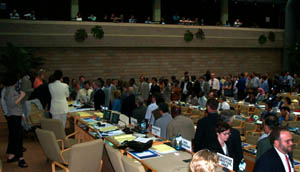 |
| Above:
delegates lining up to cast their ballots, under the watchful eye
of the Secretariat |
IN
THE BREEZEWAYS
Attempts to relax CITES regulations on the issuance of permits for
cross-border transfers of diagnostic samples, including cell culture
and serum, with the expressed intent of conservation, was torpedoed
by many delegates and observers. Some delegates said that the strongest
proponents also host the world's leading pharmaceutical agencies,
and speculate the increased demand for blood from the African Chimpanzee,
following scientific findings that they may harbor the origin of the
HIV/AIDS virus, may explain the urgency in resolving this old CITES
issue. Participants conceded that the proposal covers samples for
medical commercial uses as well, thus relaxing the rules within CITES
may provide a loophole needed to circumvent CBD provisions on access
and benefit sharing of genetic materials. While many acknowledged
the problem, they say a solution is evasive and unlikely to be resolved
without CBD cooperation. |


